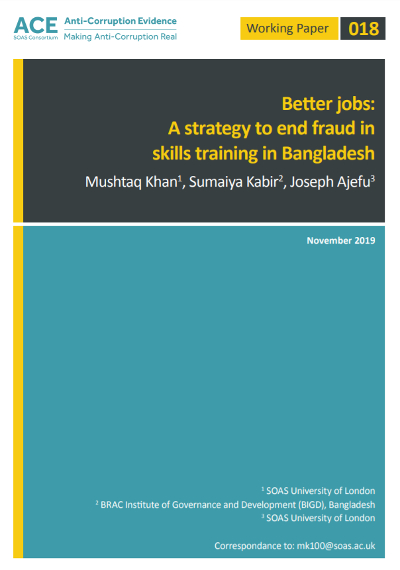
Publication Type: Working Paper
Countries: Bangladesh
Authors: Mushtaq Khan, Sumaiya Kabir, Joseph Ajefu
Publication date: November 2019
Keywords: Skills
Publicly funded skills training programmes have generated poor employment and productivity outcomes across developing countries because the governance of skills programmes is not straightforward. Value for money is best assessed by trainees actually getting jobs or getting jobs with better pay. But this is a difficult target, and different types of fraud, collusion and corruption can be used to misreport outcomes and to hide the problem that policy needs to address.
Training providers in the public sector in Bangladesh have suffered from severe governance problems. Apart from straightforward leakages of funds, there has been widespread political interference in the selection of trainers and trainees, as well as inefficiencies in the management and delivery of training. This paper focuses on private training providers (PTPs) which have emerged as the most significant segment of the market in Bangladesh. As the role of PTPs has increased across developing countries, a common strategy to align their incentives with good training outcomes has been to pay the training provider staggered fees for each trainee at the point of enrolment, graduation and finally employment. In theory, this should create incentives for the trainer to provide employment-generating training, but it can also create incentives to misreport employment and engage in other types of collusion and corruption when submitting invoices.
We examine the causes and possible solutions to this problem, as it affects a critically important activity for sustaining inclusive growth and improving wages and conditions for the poor. To access this sensitive information, we developed research relationships with two important skills programmes in Bangladesh. The first was a partnership with Palladium International, an international development company, who run the Sudokkho skills programme in Bangladesh and the second with UCEP, a well-known non-governmental organisation (NGO) providing skills training.
Read the Briefing Paper.

